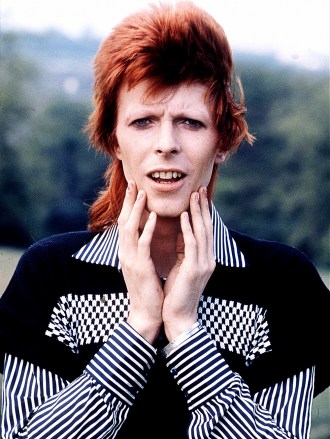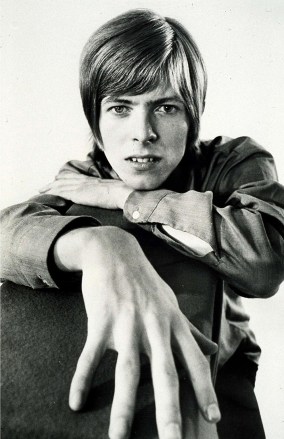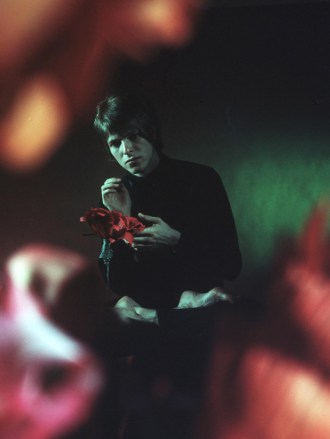John Cameron Mitchell & Donny McCaslin Discuss Honoring Bowie With Blackstar Symphony
Share

View gallery
More than six years after his passing, David Bowie‘s work continues to be a brilliant North Star for many, helping them navigate their personal and artistic journeys. Two souls who have charted their paths in this life with help from the late music icon are John Cameron Mitchell, the Tony Award-winning mind behind Hedwig and the Angry Inch, and Donny McCaslin, the dynamic jazz saxophonist who performed on Bowie’s final album, Blackstar. “He was a guiding light for me,” John Cameron Mitchell tells HollywoodLife when discussing the BLACKSTAR SYMPHONY ahead of its debut performance. “I only met him once, in his rehearsal studio after he saw Hedwig. And he said, ‘John, you got it.’”
“And you know? I could have died after such a compliment,” adds John. He will be the featured vocalist when the BLACKSTAR SYMPHONY makes its debut performances at the Charlottes International Arts Festival on Sept. 16-17. A collaboration between artist director McCaslin and The Charlotte Symphony Orchestra, led by conductor Tim Davies, the BLACKSTAR SYMPHONY is a chance to celebrate Bowie’s final album with a unique interpretation. The 65-piece orchestra will feature musical arrangements by orchestrators Jules Buckley, Tim Davies, Vince Mendoza, Maria Schneider, Jamshied Sharifi, Michael Dudley Jr., and Vellu Halkosalmi.
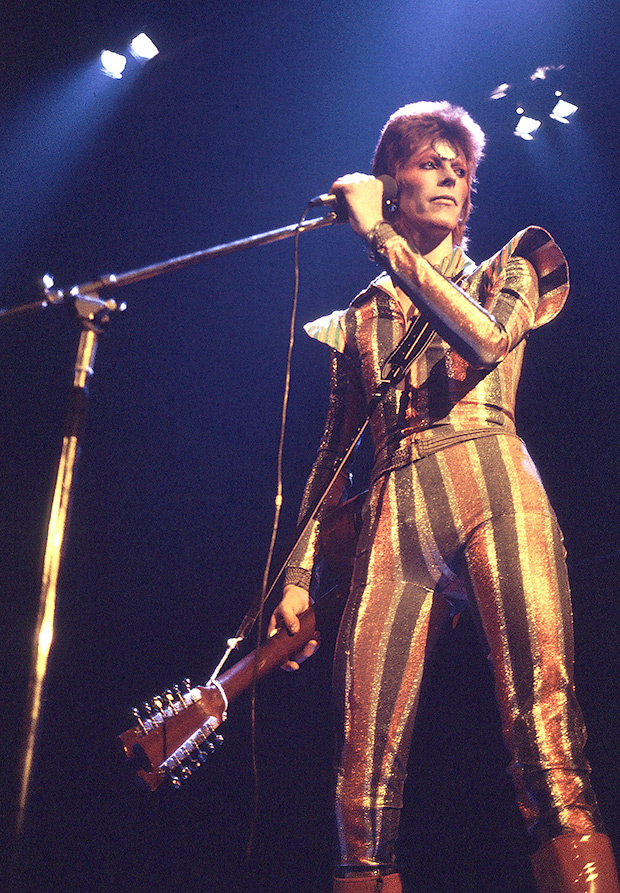
For some, this might be the first time they hear Bowie’s final work. “I know his passing had a lot to do with it, but I think [Blackstar] is a record that maybe hasn’t been listened to as much as others,” McCaslin tells HollywoodLife. “I hear people say that ‘it took me so long to listen to that record’ because of everything that happened. I feel the same way. After all that went down, I couldn’t listen to it – or if I would, it elicited such strong feelings. When I finally was able to, I remembered the joy of his reaction when we were in the studio, or when we would get that take we would use for each song or just these different memories.”
“He was just so joyful in the studio,” adds McCaslin. “And I think he was so happy with how the music was received early on. Before Blackstar came out, he held screenings for different folks in the industry, and the feedback was so overwhelmingly positive. And I remember that meant a lot to him. He had put so much work into it.”
McCaslin assures that the BLACKSTAR SYMPHONY performances won’t simply be a recreation of the album, note for not. “They have a very different feeling than the album, which feels more claustrophobic, and, of course, the Philharmonic feels huge,” says Mitchell. “And strangely, more light. There’s more hope in it, I think, when it’s opened up that way. Looking at the songs, which are beautifully written, the album has a kind of formality about them. That feels kind of very much like a group of art songs. Like, songs for a royal court.”
“These would be the songs that the avant-garde court musician would provide for the intellectual king who was on his way out,” says Mitchell. “He wrote this album as he was dying, and you want the lyrics to approach that directly, but it’s always glancingly and tangentially. Bowie never hit it on the nose; he always took the angle that made it more interesting, and I’m grateful for that.”
“He was very much a theater person, even though he didn’t necessarily do plays or musicals, you know?” he said. “Which is why I relate to him so much. His unrealized 1984 musical, with incredible songs like ‘Big Brother’ and ‘Sweet Thing.’ It was a tragedy that they never continued that. After he came to Hedwig and was really into it, he asked if I would look at Ziggy Stardust to adapt for the stage. My one regret in life is that I didn’t, because I was burned out on Hedwig.”

The BLACKSTAR SYMPHONY will see Mitchell take the stage again for the first-ever live performance of the Blackstar album with a full symphony orchestra (with a second act featuring beloved entries from Bowie’s catalog.)
“I was invited by Jules Buckley and the Metro orchestra to do a project with them a few years ago,” McCaslin says when discussing the creation of the BLACKSTAR SYMPHONY. “And that was a series of concerts in Europe, and it was my music, for the most part. I had just released a record around that time called Blow. That was this hybrid record very influenced by Blackstar and very influenced by David. It was some instrumentals and collaborations with different songwriters and singers.”
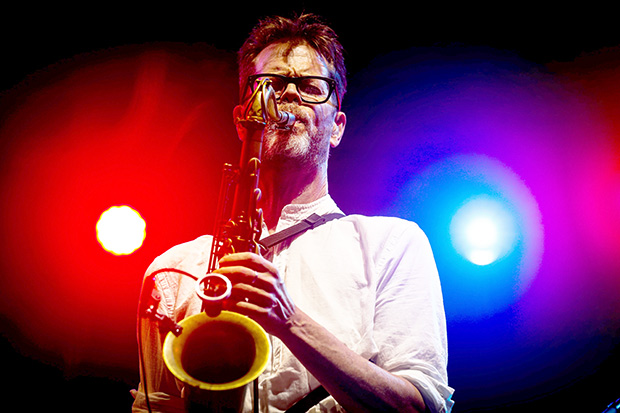
“So, we included ‘Warszawa,’ [on the tour] which is one of my favorite songs of [Bowie’s],” continues McCaslin. “That song is particularly meaningful because about two weeks after David passed, we started a week-long run at the Village Vanguard. It was my first time there as a bandleader, and as you remember, it was a very intense time. Everybody was processing the release of Blackstar and then his sudden departure. David had been planning to actually come down and sign with us, sort of unannounced and do a couple of songs from Blackstar. And things didn’t play out that way.”
“And so, I thought, ‘well, let’s find something that we can play in his honor.’ So we played ‘Warszawa’ every set of every night that week. So, Tim Davies, who’s conducting in Charlotte, he did an orchestration of ‘Warszawa’ that was fantastic. And we were sitting over dinner, Jules and I, who was conducting the Metropolitan Orchestra, and we started about just how great ‘Warszawa’ was, and it just kind of came up, ‘what about doing Blackstar with an orchestra?’”
McCaslin said he had been offered chances to perform the music in the years since Bowie’s passing, but “it didn’t feel right” because “the music is so sacred to me.” Yet, the idea of reimagining the work with an orchestra was “compelling and exciting.” From there, his manager got McCaslin, Buckley, and conductor Davies involved, ultimately leading to the BLACKSTAR SYMPHONY.
“I reached out to Tony Visconti,” McCaslin tells HollywoodLife, referring to producer and arranger who worked with Bowie from his self-titled 1969 release to his Berlin trilogy (Low, “Heroes,” Lodger) to Blackstar. “With Tony and David’s history, I thought it would be really great to have him, and so he did a couple of arrangements” for this new orchestral project.
“We want to create something new while retaining the DNA of each of these songs,” McCaslin adds. “We look for different places where we can stretch things and try to make it into something new, but at the same time, always keeping the idea of like, ‘Would David have dug this?’ And I’m fortunate that Gail Ann Dorsey is one of the featured singers. She was in David’s band for many years, where she played bass and sang. She knew David well, and I often run ideas by here. I feel like she had an intimate sense of his aesthetic, having spent so much time with him.”
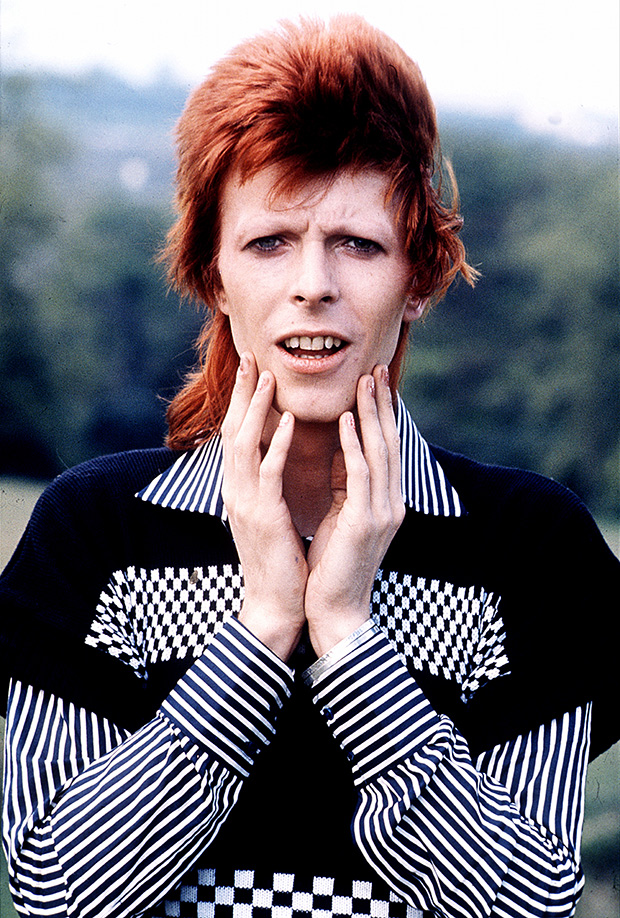
“Bowie was aware of his stature,” says John Cameron Mitchell, “and, in some ways, he was kind of an aristocrat of rock — but he also resisted his knighthood, you know, that was offered to him. He didn’t want to be pigeonholed, didn’t want to be pinned down. He wasn’t a creature of the establishment, but he also interacted with it like a head of state with another head of state. The commercial world was its own thing, and he would have decorous meetings with it at times, but he was never controlled by the market.”
“He did have that kind of like classical viewpoint,” adds Mitchell. “He was truly an original and beyond any of the people that were happening at the time. You know, he, he was a magpie, right? He loved his Bob Dylan and his Andy Warhol. He was a fan – Hunky Dory was a fan’s album. It was him saying, ‘these are all the things I love, and I’m sticking them up on my wall.’”
Speaking of Hunky Dory, Mitchell says that release remains his favorite of Bowie’s many works. “I have a lot of favorite albums,” he says, “but I think it’s my still my favorite Bowie album. Every one of his albums from the seventies was a masterpiece, and there were incredible moments and songs after that, but it’s still the one that feels innocent. And I like the eclecticism. I like that he’s trying everything to see what sticks against the wall — and pretty much everything does, you know, stick in the ear and in the brain.
“But, he’s still got an innocent [way] — he’s not as distant as some of the later songs. He’s always been our most Brechtian rock singer,” he adds. “But, every stage of his career is fascinating in some way. And I model myself on his way of working, meaning investigating new paths of telling a story with different collaborators at different times.”
What story will Mitchell tell when he takes the stage for the BLACKSTAR SYMPHONY? “Blackstar is a more decorous album, you know? It’s not an ‘out of control’ album. It’s got extreme feelings under it, so though, for example, he would repeat a certain phrase the same way often, it wasn’t like he wasn’t burying it massively. It was almost like he was writing for an orchestra, like an art song.I think I might try to interpolate my own take on it that might be considered a bit more – what’s the word? – I want to inject some spontaneity in there. And you will see what they’ll let me get away with.”
“But I don’t want it to be a museum performance. I’m not trying to imitate [Bowie],” he adds. “I’m not trying to do it exactly the way he did. As I’ve said, the sincerest form of flattery is interpolation, not imitation.”
For more information on Blackstar Symphony, The Music of David Bowie, visit CharlotteArtsFest.com.

